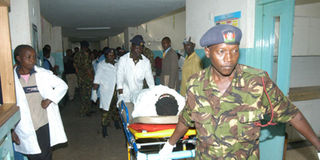Toll rises to 111 from tanker explosion

Military and doctors at the Rift Valley Provincial General hospital as they organise for transfer of tanker explosion survivors to Kenyatta National Hospital. Photo/JOSEPH KIHERI
The death toll from the oil tanker explosion in Molo has now risen to at least 110 people.
Rift Valley PC Hassan Noor said 91 bodies had been counted at the scene, while 20 more had been taken to the mortuary.
Kenya Red Cross says most of the over 100 dead were women and children, besides the men who rushed to the scene upon learning that an oil tanker had overturned along the road.
Prime Minister Raila Odinga and several Cabinet ministers including Internal Security minister George Saitoti, Public Health Minister Beth Mugo and Education minister Sam Ongeri and some Members of Parliament visited the scene this Sunday morning.
President Kibaki, currently in Ethiopia for the 12th African Union (AU) Heads of State and Government sent his condolences to those who had lost their loved ones.
Speaking at the accident scene, the Prime Minister condoled those who had lost their loved ones, while calling for mass education to ensure that such a tragedy do not recur.
"This is a terrible blow to the nation of Kenya," he said, adding that this was not was not the first time such an accident had occurred. He asked Kenyans to keep a safe distance from such accidents if it were to happen.
By Saturday midnight, the Red Cross said they had counted 91 bodies at the scene, and organisation’s head of disaster management, said the number could rise.
Three police officers are reported to be among those who perished in the fire as they tried to control the crowd who were siphoning off petrol from the oil tanker before it burst into flames near Molo town.
Many more sustained life-threatening burns in the explosion near Jolly Farm on the Nakuru-Eldoret highway at about 7.30 p.m, Saturday.
Relatives of missing persons can call +254 722300701 or contact Red Cross officials on the ground on +254 720 460 438 or +254 720 430455.
Body bags
Rift Valley PC Hassan Noor Hassan on Saturday said that he had ordered 150 body bags to the scene in case the death toll went that high.
Two hours after the fire started there had been no effort to put it out and a Sunday Nation writer could still see bodies burning away from a distance of about 50 metres.
The Nakuru Municipal Council’s fire engine arrived at the scene more than an hour after the explosion. Molo town has no fire engine.
Rescuers who rushed to the scene had been unable to move in and rescue the victims due to the intense heat.
Molo deputy police boss Daniel Kamanza told the Sunday Nation that he had counted 50 bodies of people who had burnt beyond recognition.
“The number could even be higher,” Mr Kamanza said.
A huge traffic jam built up on both sides of the highway as police blocked off vehicles to avoid secondary accidents. A number of motorcycles and two vehicles also caught fire in the late evening inferno that attracted dozens of shocked onlookers.
Medical staff at the Molo District Hospital where the injured were rushed by good Samaritans were fighting to save the burnt.
Reports from Provincial General Hospital Nakuru indicated that more than 100 victims of the fire tragedy had been received.
Mr Hassan was last night at the scene of the accident to spearhead the rescue efforts. The fire tragedy was the second to hit the country this week.
An eye witness told the Sunday Nation that officers from a nearby GSU camp were the first to arrive at the scene after the tanker crashed. According to the witness, the officers began demanding a fee from those who wished to scoop petrol spilling from the tanker.
“I heard someone saying that they were going to avenge the fee by starting a fire and left the scene fearing for my life,” the eyewitness said.
“Moments later, I heard the explosion.”
In the confusion the bus left the road and crashed. It is suspected that some of those who burnt were passengers on the bus.
In an earlier interview on Saturday, the Nakuru Municipal Council had conceded that it lacks the capacity to fight big fires.




